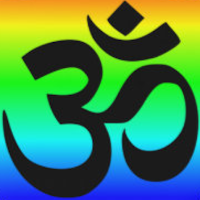Aham Brahmāsmi (अहम् ब्रह्मास्मि) – “I am Brahman” (Brihadaranyaka Upanishad 1.4.10 of the Yajur Veda):
brahma vā idamagra āsīt, tadātmānamevāvet, aham brahmāsmīti | tasmāttatsarvamabhavat; tadyo yo devānām pratyabubhyata sa eva tadabhavat, tathārṣīṇām, tathā manuṣyāṇām; taddhaitatpaśyannṛṣirvāmadevaḥ pratipede, aham manurabhavaṃ sūryaśceti | tadidamapyetarhi ya evaṃ veda, aham brahmāsmīti, sa idaṃ sarvam bhavati, tasya ha na devāścanābhūtyā īśate, ātmā hyeṣāṃ sa bhavati; atha yo'nyāṃ devatāmupāste, anyo'sāvanyo'hamasmīti, na sa veda, yathā paśurevam sa devānām | yathā ha vai bahavaḥ paśavo manuṣyam bhuñjyuḥ, evamekaikaḥ puruṣo devān bhunakti; ekasminneva paśāvādīyamāne'priyam bhavati, kiṃu bahuṣu? tasmādeṣām tanna priyam yadetanmanuṣyāvidyuḥ || 10 ||
This [self] was indeed Brahman in the beginning. It knew itself only as “I am Brahman.” Therefore it became all. And whoever among the gods had this enlightenment, also became That [Brahman]. It is the same with the seers (rishis), the same with men. The seer Vamadeva, having realized this [self] as That, came to know: "I was Manu and the sun." And to this day, whoever in a like manner knows the self as "I am Brahman," becomes all this [universe]. Even the gods cannot prevent his becoming this, for he has become their Self.
(tr-Nikhilananda)








